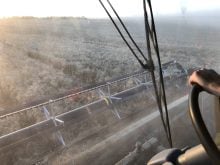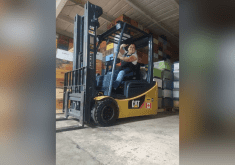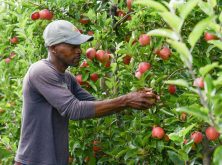A flexible and open-minded approach is necessary to address the labour shortage in Manitoba’s ag industry, say stakeholders.
The sector needs employees in areas of digital agriculture, mechatronics and clean energy technologies, as well as veterinary professionals. To address this, Manitoba Agriculture is taking a four-pronged approach by investing in people, creating industry sustainability, analyzing the supply chain and sharing responsibility for the industry’s future.
To discuss the challenges, Holly Klann, co-op education co-ordinator with University of Manitoba agriculture and food sciences, Atish Kulkarni, head of biocarbon research with Carbon Lock Technologies, and Randy Dyck, director of talent with Kroeker Farms, participated in a July 31 webinar hosted by Manitoba Agriculture.
Read Also

Global humanitarian aid slashed by one-third
Humanitarian aid around the world was cut by a third in 2025 and Canada is one of the culprits.
Why it matters: Workforce shortages are a limiting factor for agriculture in Manitoba.
Dyck said it’s important that people see agriculture as a broad sector with many opportunities, rather than as “just” a farm.
“We have a tremendous packing facility, and with advancements in agriculture … especially in our packing facility and on some of our more advanced equipment, we’re operating with sensors and all kinds of … computerization,” he said.
As technology advances, it’s hard for Dyck and others in the industry – especially in the maintenance field, where things are transitioning from mechanical to technological – to find skilled employees.
“It’s changed a lot, right from agriculture into our agronomy department,” he said, adding the use of drones and artificial intelligence is accelerating this.
As someone who works in an agriculture-adjacent field, Kulkarni said his ideal employee has multiple skills. Equally important is someone willing to develop new skills and who has a lot of soft skills such as communication and teamwork.
“Someone who is willing to go above and beyond what their skill set demands is someone that we struggle to find,” he said.
If employers focus too much on finding workers that tick every box for the specific skills they need, it is more of a challenge, Klann said. This is where mentorship can play a pivotal role.
“Mentoring a motivated student while they’re still in school is a good way to fill those gaps, as well (as) assessing the fit and adaptability of that employee. Then you can … (put them) in a permanent, full-time role after graduation.”
Kulkarni agreed, advising that employers not focus too much on finding a candidate who is a perfect fit.
“What has helped us earlier has been moving away from looking at the exact qualifications, but then looking for someone who is flexible and willing to learn new things,” he said.
Networking is also valuable, Kulkarni added. Businesses can collaborate with colleges, universities and industry associations. Carbon Lock Technologies works with the University of Manitoba and the University of Winnipeg.
“Building a network of these collaborators and potential students as well helps us with the hiring process more efficiently, rather than just posting it online,” Kulkarni said.
Students who have just graduated from programs in Winnipeg can have difficulty commuting or relocating. Employers can help by offering mileage incentives or assisting with relocation costs.
“Even if you offer to help them find a temporary place during a summer internship, that can help a lot,” Klann said.
Employers are also looking for people who are passionate about the industry. Employees who askNthe right questions will always be an asset, Kulkarni said.
“Also something that we look for is someone who can present their past work really well. Working in a startup requires you to talk about what kind of work you do very often with people outside of your little bubble.”
He asks potential candidates to show him something they’ve done in school or at a previous job, even if it’s not directly related to the position for which they’re applying.
The agricultural industry is much more than working on a farm, and it’s vital that this message spreads to young people today, said Dyck. Technology has long been a part of agriculture, and now it’s advancing at an ever-quickening pace, creating more opportunities.
“There’s this whole career path you can go, from equipment to agronomy, into all kinds of technological advances,” he said.
The agricultural industry is unique in its diversity, Kulkarni said. The more resilient new hires are, the more resilient the entire ag industry will be, he added.
“To be in the farming industry, you need to be able to stand back up after another failed day or month or season and keep coming back at it.”


















